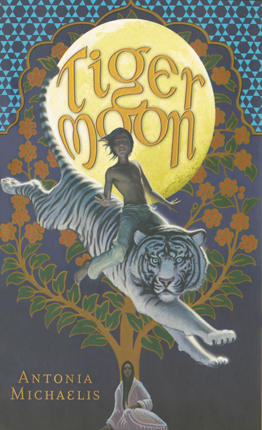Full Text Reviews: School Library Journal - 11/01/2008 Gr 8 Up-In this fairy tale of India set during the early 1900s, Raka, a young bride who is awaiting certain death at the hands of her evil husband, spins a story for Lalit, a servant in the Rajah's house. In her tale, a con man and a thief, Farhad, is recruited to rescue the Hindu god Krishna's daughter from marriage to a demon king. He is aided by a sacred white tiger and carries a bloodstone that almost causes his death. As the two stories intertwine, the lines between fantasy and reality are blurred. The plot is fast paced and exciting, and the story gives an excellent overview of the conflicts of India at the time of British occupation, and of Hindu religious beliefs. The factual background adds to the overall feel of a wildly colorful and diverse country. The character development is also admirable, as readers see Farhad grow from a scared 16-year-old thief to a hero willing to die for his cause. What is most amazing about the story is the beautiful language and phrases that make readers feel as though they are sitting in India listening to Raka's story. A distinguished book for older fairy-tale fans.-Jennifer-Lynn Draper, Children's Literature Consultant, Oshawa, Ontario, Canada Copyright 2008 Reed Business Information. - Copyright 2008 Publishers Weekly, Library Journal and/or School Library Journal used with permission. Booklist - 10/15/2008 *Starred Review* Deftly interweaving Indian history, culture, and mythology, this richly layered tale, set in India at the beginning of the twentieth century, beautifully illustrates the power of storytelling. Having failed to escape a forced betrothal to brutish merchant Ahmed Mudhi, Safia is now a captive in his palace. While awaiting her wedding night, she is befriended by a palace servant, Lagan, and begins to tell him the story of a young thief, Farhad; his talking, sacred tiger companion; and their quest to retrieve the fabled Bloodstone in order to rescue a princess from the Demon King. Safia and Farhad's intersecting stories illuminate themes of destiny and free will; immortality and rebirth; compassion and humanity; and the power of stories to entertain, inspire, and transform. Originally published in Germany, Michaelis’s novel is an absorbing epic with diverse characters, written in lyrical prose that combines vivid imagery with droll, sometimes pointed commentary and some mature plot elements: Safia is sentenced to death, for example, after Ahmed discovers that she is not a virgin. Michaelis proves a highly accomplished storyteller in this sweeping, beguiling tale where things and people are not always as they seem and where characters (and readers) discover that “stories are an excellent way of escape.” - Copyright 2008 Booklist. Bulletin for the Center... - 01/01/2009 Safia, sold by her Hindu parents to become the eighth wife of a cruel Muslim merchant, knows that her life is forfeit once he realizes she is not the virgin he thought he’d purchased. As she awaits her fate, she finds comfort in telling an elaborate story to Lalit, a young servant she befriends, an assumed eunuch of the Rajah’s court. The book continues in divided portions, alternating between brief passages about Safia and her growing relationship with Lalit, and much lengthier sections that are Safia’s story about Farhad, a thief-turned-hero who travels through colonial India with his best friend, a sacred white tiger, on a quest to save Krishna’s daughter from a demon king. The intricacy and excitement of Farhad’s adventures offer a haunting contrast to Safia’s trapped and dull existence, and Michaelis emphasizes these differences with subtle overlaps in the two parallel narratives. The theme may recall the legend of Scheherezade, but this is definitely an original creation. Some of the originality, though, interferes with the book’s success: the blurring of Safia’s story and her reality undercuts the emotional impact of both and makes it difficult for readers to tease out the events, so the style of the writing, translated from the German, tends to overshadow the story itself. Readers may, however, be sufficiently committed to both sets of protagonists to revel in the heroic, sweeping conclusions to both stories despite their tendency toward opacity. Ultimately, this rich, almost poetic novel will make the biggest impact on those as pleased by the elegant writing style as by the intriguing if sometimes obscure content. AS - Copyright 2009 The Board of Trustees of the University of Illinois. Loading...
|



